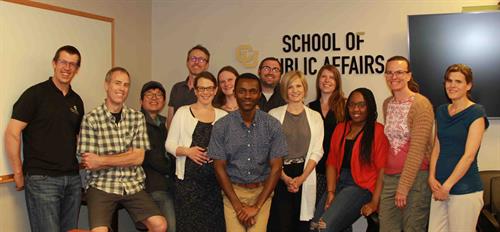CU Denver School of Public Affairs hosts 2019 IPPA Spring Policy School
Policy scholars and doctoral students from around the world attend week-long
Toula Wellbrook | School of Public Affairs May 30, 2019
University of Colorado Denver School of Public Affairs hosted the 2019 International Public Policy Association (IPPA) Policy School, which was held May 20 – 24, 2019. This week-long policy school provides participants with a unique and valuable opportunity to engage with scholars and doctoral students from around the world.
This year, the Policy School convened five policy scholars, focusing on different theories in public policy, and more than twenty students from different parts of the world. Each scholar gave a three-hour lecture to the full group, followed by a discussion. Students also presented their research during small group sessions and received feedback from their peers and policy scholars. The policy school culminated in a roundtable that wrapped up key lessons from the week. On the social side of things, there were a couple of dinners and a trip to enjoy Colorado’s natural wonders.
Dr. Sam Workman, University of Oklahoma, presented the Punctuated Equilibrium Theory (PET), focusing on its explanation of policy change and the role that attention plays in the process. The key highlights were that attention occurs at the individual and institutional levels, that political power shapes institutional configurations in influencing attention, and that the PET emphasizes endogenous policy change. Dr. Workman explained that a fundamental limitation of the PET is that it fails to address the reasons why policy change occurs clearly. He and other scholars working with PET are attempting to resolve this limitation by understanding the role of information processing in institutions.
Dr. Christopher M. Weible, University of Colorado Denver, presented on the Advocacy Coalition Framework (ACF), which was developed by Paul Sabatier and Hank Jenkins-Smith in the 1990s, to explain policy change. Dr. Weible traced the development of the ACF attempts to overcome the limitations of the Policy Cycle, which took a narrow view of the policy process. After explaining the three main theoretical emphases of the ACF, including policy coalitions, policy learning, and policy change, the lecture presented key lessons and progress from the ACF. This includes the presence of coalitions and confirmation of most of the empirical hypotheses of the ACF. Beyond these lessons, he explained some of the analytical challenges confronting the ACF, such as parsing the concept of policy learning and the conflicting diversity in measuring policy coalitions.
Dr. Jennifer Dodge, University at Albany, SUNY, presented on the Interpretive Approach to framing policy conflict. Dr. Dodge distinguished between Discourse Coalitions and Advocacy Coalitions, and clarified the role of frames and framing in advancing policy positions. Further, she highlighted the importance of discourses in shaping the frames that actors adopt to advance their policy positions. She also gave the group opportunities to practice identifying framing elements in sample hearing testimony dealing with hydraulic fracturing policy in New York.
Dr. Will Swann, University of Colorado Denver, presented on urban policy and politics and the Institutional Collective Action (ICA) Framework. Dr. Swann identified some important themes that have shaped urban policy and politics, including spatial inequality, urban protest, complexity theory, and institutional approaches to urban politics. Dr. Swann explained the foundational pillars of the ICA and suggested how to tackle some weaknesses of the framework, such as parsing concepts like transaction cost and the relationship between authority and uncertainty.
Dr. Paul Cairney, University of Stirling, U.K., presented on the politics of evidence-based decision making. Dr. Cairney emphasized the challenge of defining evidence and the importance of clarifying terminologies used in communicating with policymakers. He further suggested five steps that could be applied in communicating evidence, such as deciding what evidence counts, rejecting simple models, and thinking about what constitutes good models.
In their reflections about the Policy School at the end of the week, students gave positive, thoughtful testimonies about their experiences. One such testimonial follows:
“This has been one of, if not the most, intellectually challenging, stimulating, and productive weeks in doctoral study. The discussions, talks, and workshops were constructive and kept me on my toes. The faculty and students were top-notch, and the environment is positive and growth-focused. I am honored to be here and grateful to IPPA and the University of Colorado for the opportunity to attend, and to the faculty and my peers for every interaction.”
The 2019 Denver Edition of the IPPA Policy School was a resounding success and it benefited students immensely. It is rare for doctoral students to have the opportunity to closely interact with top scholars outside of their own institution. Opportunities like this week-long Policy School allow students to improve the quality of their own research, puts them in contact with research advances or theoretical approaches outside of their own specialty, and ultimately works to strengthen the field by better preparing future scholars and building relationships among them.